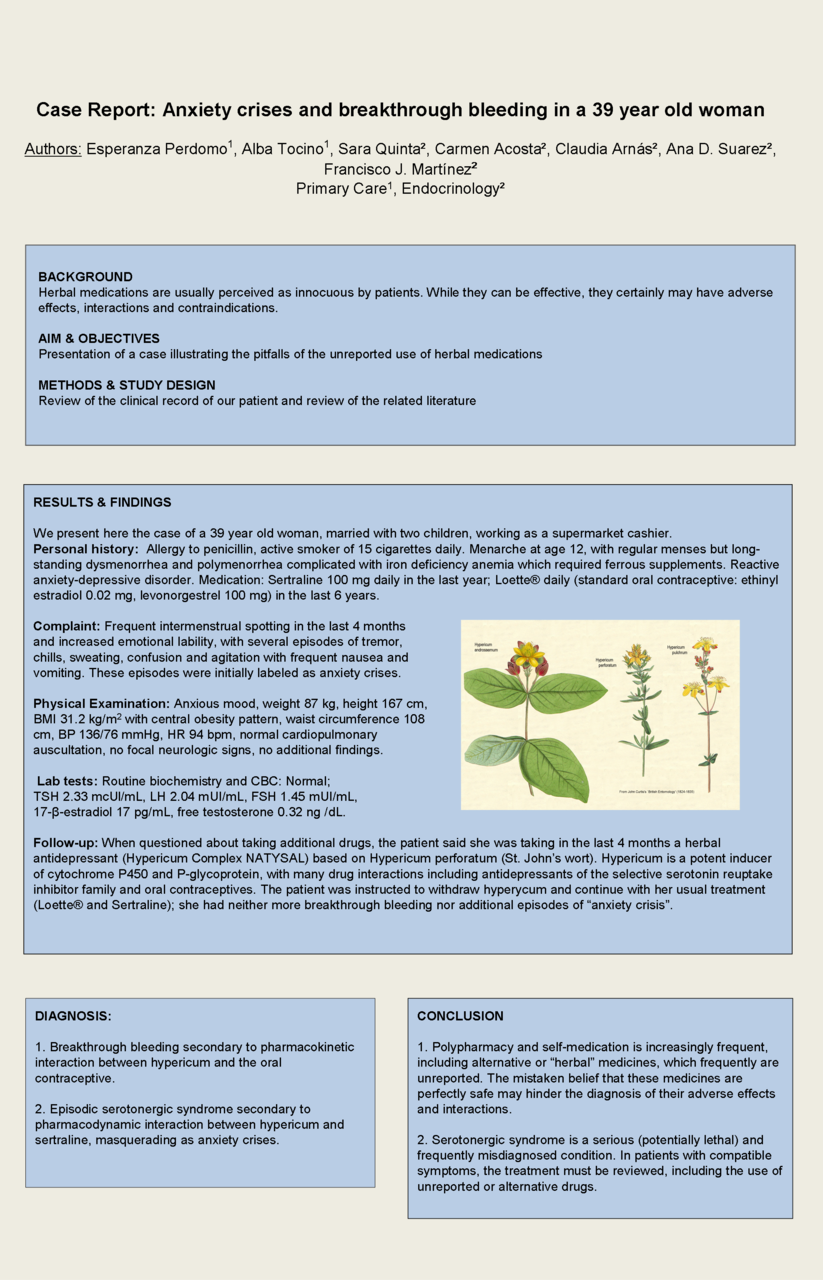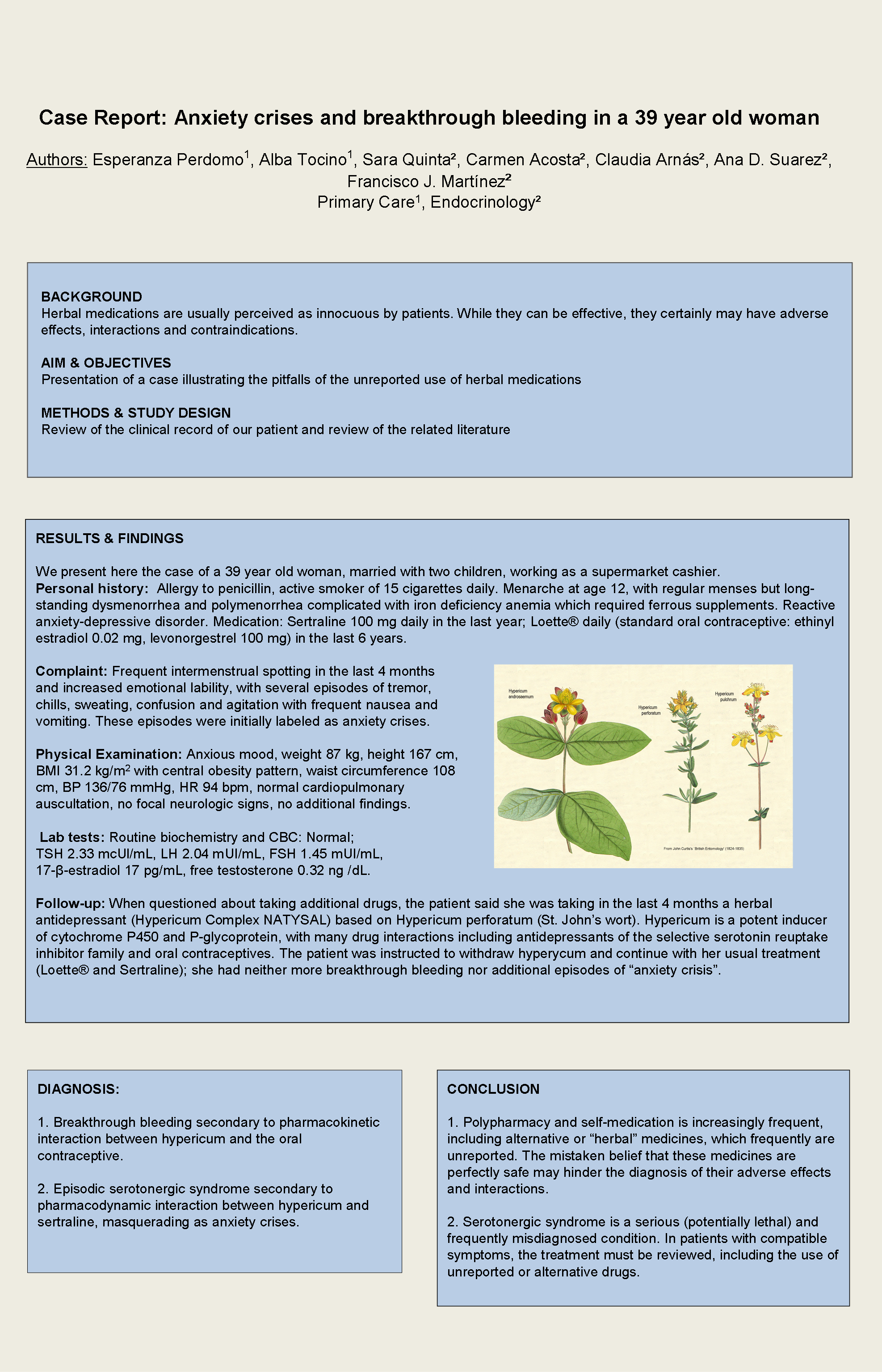Abstract
BACKGROUND
Herbal medications are usually perceived as innocuous by patients. While they can be
effective, they certainly may have adverse effects, interactions and contraindications.
AIM & OBJECTIVES
Presentation of a case illustrating the pitfalls of the unreported use of herbal medications
METHODS & STUDY DESIGN
Review of the clinical record of our patient and review of the related literature
RESULTS & FINDINGS
We present here the case of a 39 year old woman, married with two children, working as a
supermarket cashier.
Personal history: Allergy to penicillin, active smoker of 15 cigarettes daily. Menarche at age
12, with regular menses but long-standing dysmenorrhea and polymenorrhea complicated
with iron deficiency anemia which required ferrous supplements. Reactive anxiety-depressive
disorder. Medication: Sertraline 100 mg daily in the last year; Loette® daily (standard oral
contraceptive: ethinyl estradiol 0.02 mg, levonorgestrel 100 mg) in the last 6 years.
Complaint: Frequent intermenstrual spotting in the last 4 months and increased emotional
lability, with several episodes of tremor, chills, sweating, confusion and agitation with frequent
nausea and vomiting. These episodes were initially labeled as anxiety crises.
Physical Examination: Anxious mood, weight 87 kg, height 167 cm, BMI 31.2 kg/m2 with
central obesity pattern, waist circumference 108 cm, BP 136/76 mmHg, HR 94 bpm, normal
cardiopulmonary auscultation, no focal neurologic signs, no additional findings.
Lab tests: Routine biochemistry and CBC: Normal; TSH 2.33 mcUl/mL, LH 2.04 mUI/mL, FSH
1.45 mUI/mL, 17-β-estradiol 17 pg/mL, free testosterone 0.32 ng /dL.
Follow-up: When questioned about taking additional drugs, the patient said she was taking in
the last 4 months a herbal antidepressant (Hypericum Complex NATYSAL) based on Hypericum
perforatum (St. John’s wort). Hypericum is a potent inducer of cytochrome P450 and P-
glycoprotein, with many drug interactions including antidepressants of the selective serotonin
reuptake inhibitor family and oral contraceptives. The patient was instructed to withdraw
hyperycum and continue with her usual treatment (Loette® and Sertraline); she had neither
more breakthrough bleeding nor additional episodes of “anxiety crisis”.
Diagnosis:
1. Breakthrough bleeding secondary to pharmacokinetic interaction between hypericum and
the oral contraceptive.
2. Episodic serotonergic syndrome secondary to pharmacodynamic interaction between
hypericum and sertraline, masquerading as anxiety crises.
CONCLUSION
Polypharmacy and self-medication is increasingly frequent, including alternative or “herbal”
medicines, which frequently are unreported. The mistaken belief that these medicines are
perfectly safe may hinder the diagnosis of their adverse effects and interactions.
Serotonergic syndrome is a serious (potentially lethal) and frequently misdiagnosed condition.
In patients with compatible symptoms, the treatment must be reviewed, including the use of
unreported or alternative drugs.






